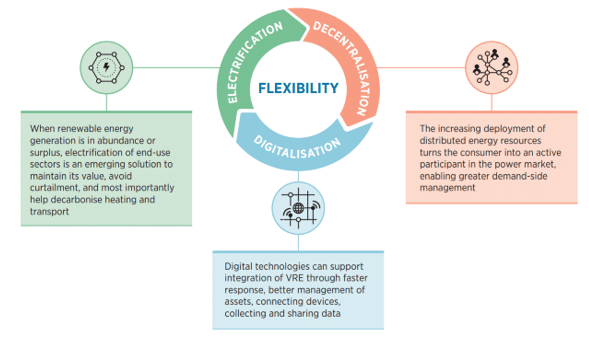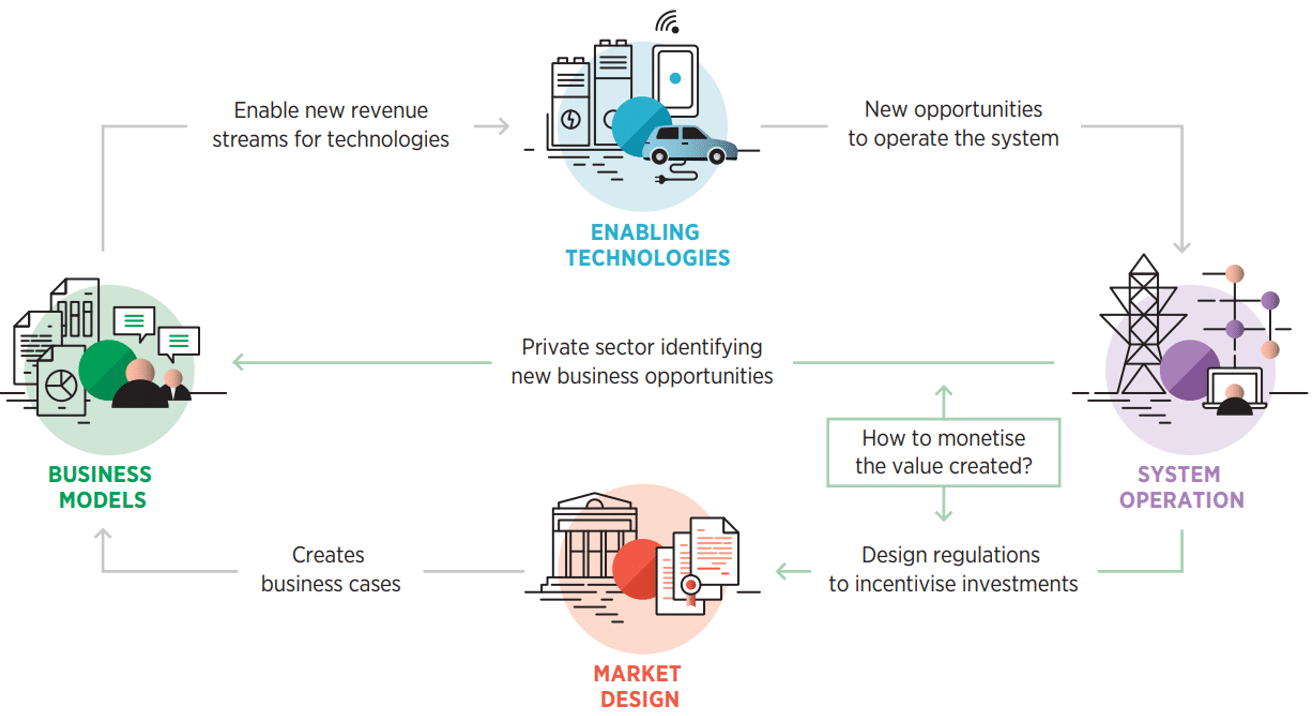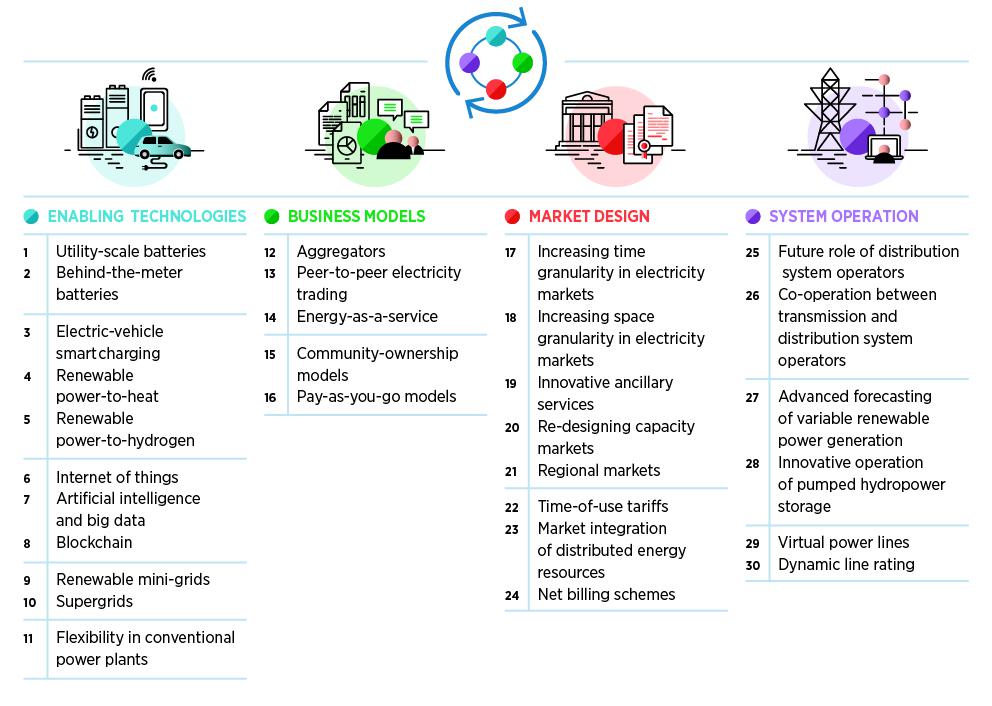We need systemic innovation to enable higher shares of renewables for the energy transition

Innovation is the engine powering the global energy transformation. Renewables are becoming the go-to option for many countries in their transition towards a secure, cost-effective and sustainable energy supply.
In an era of low-cost renewable power generation, the implementation of cost-effective strategies to integrate high shares of variable renewables into power systems will underpin the success of the energy transition. In targeting high levels of renewable energy deployment and integration, policymakers should not focus on quick wins, but rather adopt a forward-looking analysis to a time when renewable energy deployment has already been successful. Markets and systems should be therefore designed around this long-term vision and a new power sector paradigm.
The power sector transformation is accelerated by three main innovation trends: digitalisation, decentralisation and electrification (Figure 1). These trends are changing paradigms and unlocking power system flexibility for integrating higher shares of variable renewables. A decarbonised power system can then help decarbonise other end-use sectors (transport, buildings industry) through direct electrification or indirect electrification (through green hydrogen).

Source: (IRENA, 2019)
What is systemic innovation and why is it important?
Innovations are not implemented in isolation. A series of innovations – not only in technology – but also in market designs, system operation and business models are needed to successfully enable the power sector transformation, and ultimately the energy transition. Innovative solutions emerge from matching and leveraging synergies between various innovations across multiple components of the power system. This is called “systemic innovation”.
Without a proper business model, innovations in technologies cannot have a real impact. In a similar vein, adapting regulations is necessary for the creation of a framework that enables remuneration mechanisms and creates new business models for the new technologies. New technologies also create new opportunities to operate the system, in a more efficient, flexible way. Figure 2 illustrates the synergies between innovations in these four dimensions.

Source: (IRENA, 2019)
Systemic innovation for the power sector transformation
In the “Innovation Landscape for a Renewable-Powered Future” report, IRENA identified 30 key innovations that facilitate the integration of high shares of variable renewables, following the systemic innovation approach (see Figure 3).

Source: (IRENA, 2019)
Enabling technologies for infrastructure development play an important role in facilitating the integration of renewable energy. Battery storage, together with digital technologies, is changing power sector paradigms and opening doors to various new applications unlocking system flexibility. The electrification of end-use sectors, if done smartly, can emerge not only as a new market for renewables but also as a flexible demand.
Business models are essential to monetise the new value created by these technologies and hence enable their deployment. Given the deployment of distributed energy resources, several innovative business models emerge at the consumer end, along with innovative schemes enabling renewable energy supply in areas with limited possibilities, such as off-grid or densely populated areas.
Innovation in regulation and market design is needed, but there should be a balance between stable and predictable regulation that can ensure private sector investments, and flexible regulation that enables innovation. Simultaneously, the speed of regulatory innovation needs to be aligned with the speed of business model and technology innovation. Adapting the market design to new premises becomes crucial to accelerate the energy transition whilst enabling value creation and adequate revenue streams. Innovation in both wholesale- and retail markets is further required to unlock more flexibility potential which exists already in power systems.
With new technologies and a sound market design in place, innovations in system operations practices are increasingly emerging in response to the integration of higher shares of variable renewables into the grid. This includes new operating procedures that enhance electricity system flexibility, reduce variable renewables curtailment with better grid congestion management. Also, distributed generation deployment requires new ways of operating the distribution grid and market facilitation for distributed generation.
A 'one-size-fits-all’ solution does not exist. The design of an optimal strategy for each power system and the implementation of different innovations depend on the country context and system-specific variables, such as the technical and economic aspects of a given power system.
Systemic innovation for smart electrification of end-use sectors
The energy sector has started changing in promising ways, with the widespread adoption of renewables and related technologies boding well for a sustainable future. Renewable technologies are dominating the global market for new power generation capacity.
Nonetheless, this energy transition needs further acceleration of this growth and needs to encompass not only the power sector, but also the end-use sector – industry, buildings and transport. The progress in renewable power generation technologies brings opportunities to use renewable electricity as a vector to decarbonise the end-use sectors.
Smart electrification approaches, based on innovative business models and market designs, are crucial to realise these synergies and to take advantage of the potential flexibility provided by the new loads. Smart electrification enables (i) power system to accommodate the new load in a cost-efficient manner, (ii) flexibility in the power system and the integration of a higher share of renewables and (ii) from an end-use sector perspective, smart electrification would be the most cost-effective solution to decarbonise the sector.
Currently, IRENA is developing a new Innovation Landscape report for smart electrification of end-use sectors, where innovations in technology, market design and regulation, business models, and system planning and operation are showed to be essential for smart electrification. The next IRENA Innovation Landscape report will be released early next year and will how systemic innovation can enable smart electrification of the mobility sector, heating and cooling sectors and how it can enable green hydrogen production to decarbonize other end-use sectors.
About the author
 Arina Anisie is an energy expert with 7+ years of experience in developing global and regional analysis of innovations for the energy transition based on renewable energy, electrification of end-use sectors with renewables, power sector analysis and stakeholder engagement.
Arina Anisie is an energy expert with 7+ years of experience in developing global and regional analysis of innovations for the energy transition based on renewable energy, electrification of end-use sectors with renewables, power sector analysis and stakeholder engagement.
Arina is an Analyst on Renewable Energy Innovation for Developing Countries at International Renewable Energy Agency (IRENA), where she works since 2017. Prior to joining IRENA, she worked as an energy analyst at PSR Energy Consulting and Analytics, a Brazil-based consulting firm. She is an industrial engineer and holds an MSc degree in Electric Power Systems from Comillas University in Madrid, and a MSc degree in Network Industries and Digital Economy from Paris Sud XI University.
Related contents
Stay in the know
Get the Lights on Women newsletter.







